Can You Get Nerve Damage From Tattoos? Or Is It A Rumor?
Getting a tattoo is a scary feeling. It’s not just about the pain itself, and it would be lying to say that tattooing is risk-free. Although a tattoo professional tattoo artist will try their best not to inflict any danger on you but sometimes accidents happen. But, can you get nerve damage from tattoos?
Yes, hypothetically, you can get nerve damage from tattoos but it is very rare. Unless you bounce about during your tattoo or the artist is incompetent, nerve injury from a needle slip-up is unusual. If the needle goes through the hypodermis and pierces a nerve, you might suffer nerve damage.
Read on to know about whether you can heal from nerve damage, which body parts are vulnerable to nerve damage, and things you should be worried about before getting a tattoo.
How Does A Nerve Damage Happen?
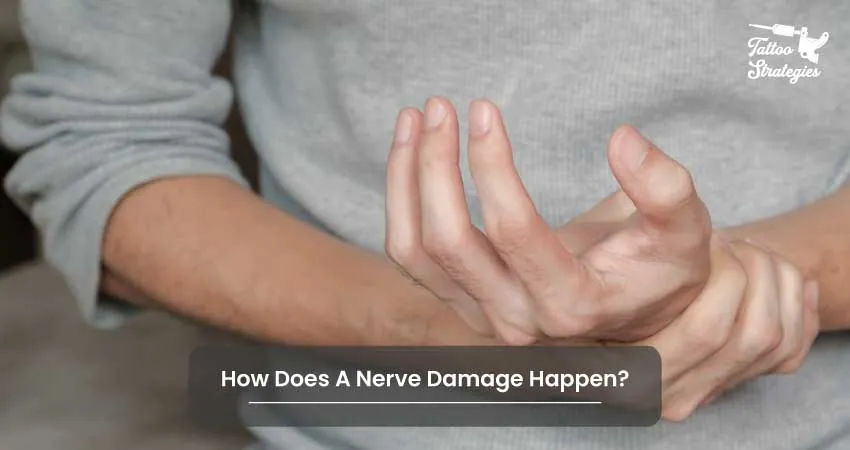
First, we must define nerve damage to comprehend the relationship between a tattoo needle and the nerves throughout the tattooing process.
In most cases of nerve damage, the nerve itself is severed by an external injury, resulting in a loss of sensation and/or motor control in the location where the injury occurred.
Tattooing, however, does not qualify as such catastrophic harm. Third-degree nerve injury is when the nerves have been extensively damaged, surgery is necessary, and the likelihood of full recovery is low.
In most cases, pain is associated with mild to severe nerve injury. Now, pain is essential here because it demonstrates that the nerves are still alive and well and have not been severed.
However, discomfort is also an indicator of nerve compression, stretching, exposure to temperature fluctuations, etc. The nerves have been damaged to the first degree at this point.
Although this pain is uncomfortable, the nerves heal quickly, and everything is well again.
Muscle weakness and tingling in the limbs are common symptoms of nerve injury. Hands and feet may tingle, and some people feel pressure as if they wore a tight sock or glove. If you’re not dealing with an actual injury but are experiencing any of these symptoms, it’s time to consult a doctor.
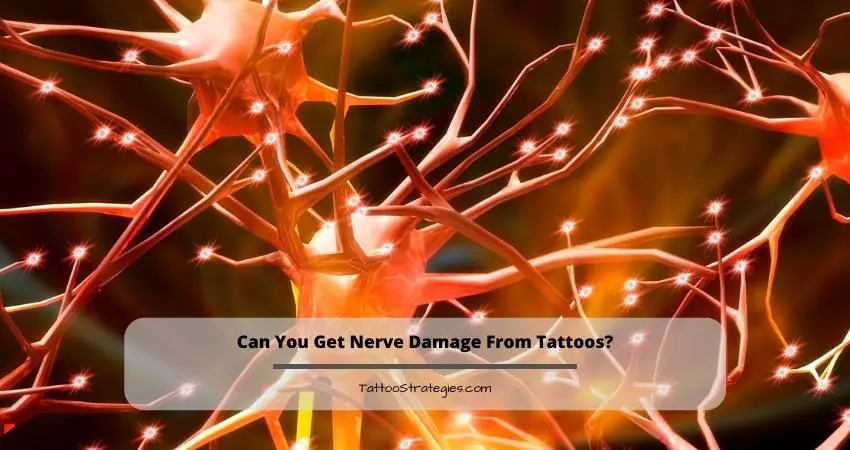
Can Tattoos Cause Nerve Damage?
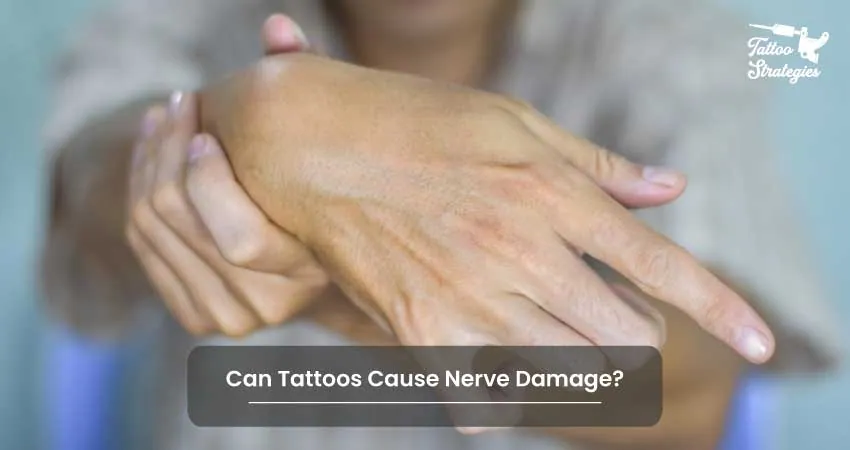
Tattoos rarely cause permanent nerve damage. It’s unlikely, but not impossible.
There are three distinct layers to our skin. There are three kinds of cells in the epidermis, the skin’s outermost layer. Your tattoo will fade over time if your artist simply inks the epidermis.
The dermis is the skin’s middle layer and contains organs, blood vessels, sweat glands, and collagen bundles. When creating permanent tattoos, artists must go below the skin’s surface.
The collagen and fat cells that comprise the third layer, the hypodermis, may be found here. No professional tattooist should ever ink above the skin’s third layer.
Tattooing too deeply into the dermis or hypodermis might cause nerve injury if the artist isn’t careful. In addition, a tattoo blowout is a possibility. Tattoo blurring occurs when ink is put too deeply (or the artist presses too hard), causing the ink to spread into many thick layers.
Needles still come into contact with nerves during tattooing, even if the artist is careful not to go too deep. That’s the deal with the anguish you’re feeling. In theory, therefore, even the most talented artist may cause nerve harm to their audience. But remember that this is quite unusual.
If you get your tattoo from a skilled expert who utilizes safe tools, it should heal without causing permanent nerve damage.
Which Body Parts Are Most Likely To Have Nerve Damage?
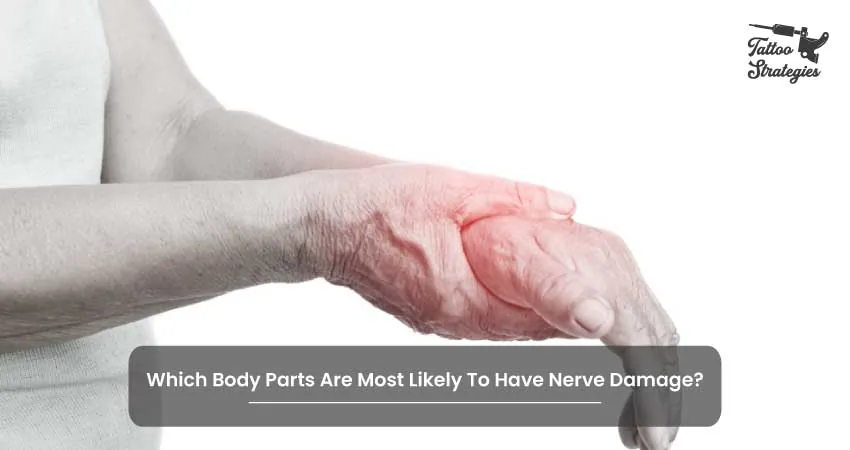
If you get a tattoo on a nerve, for example, you’re increasing the likelihood that you’ll suffer permanent nerve damage. The danger of nerve injury is increased when getting a tattoo on an area with thin skin and a high concentration of nerve endings, mainly if the tattoo artist is untrained.
Examples of them include;
- Armpits
- Feet and ankles
- Inside of the wrist
- Side of calf and shinbones
- ‘Hangs and fingers
- The outer side of the shoulder
- Private parts
The skin is exceedingly delicate, and nerve ending density is high in certain regions. They are also the most excruciating spots to have inked.
If you insist on getting a tattoo on a particularly delicate area, do it only in the capable hands of a qualified artist. This reduces the possibility of any nerve injury or tattoo blowout.
Nerve injury is more likely to occur in the hands, feet, fingers, and toes and usually presents as painful and uncomfortable spasms.
If you feel any of these cramps, tell your tattoo artist immediately so they can adjust their technique or find someone else to complete your tattoo.
Can You Heal From A Nerve Damage?

Extremely damaged nerves have a more challenging time recovering. Fortunately, the effects of tattoo machine-caused nerve damage tend to be mild to moderate. It’s possible that the nerves are just injured or shaken up.
If this is the case, the nerves may heal and regrow. Due to their slow growth rate of roughly 1 millimeter per day, this procedure might take anywhere from 6 weeks to 3 months.
You may experience tingling as your nerves begin to heal. Electric shock feelings are possible and may be pretty unpleasant. As the nerves recover, these feelings may appear to shift. This emotion should gradually go away as mending takes place.
Tingling may persist in rare cases even beyond the typical 3-month threshold. Similarly to how nerve injury is unusual, this rarely occurs.
There is an element of danger when getting a tattoo. Possible nerve injury is one of the hazards you’ll face. Fortunately, the likelihood of this happening to you is quite low.
Pick a reliable, professional tattoo artist and adhere to his aftercare recommendations. Now you may start working on your masterpiece (without worrying about damaging your nerves)!
Is Tingling After Getting A Tattoo A Sign Of Nerve Damage?
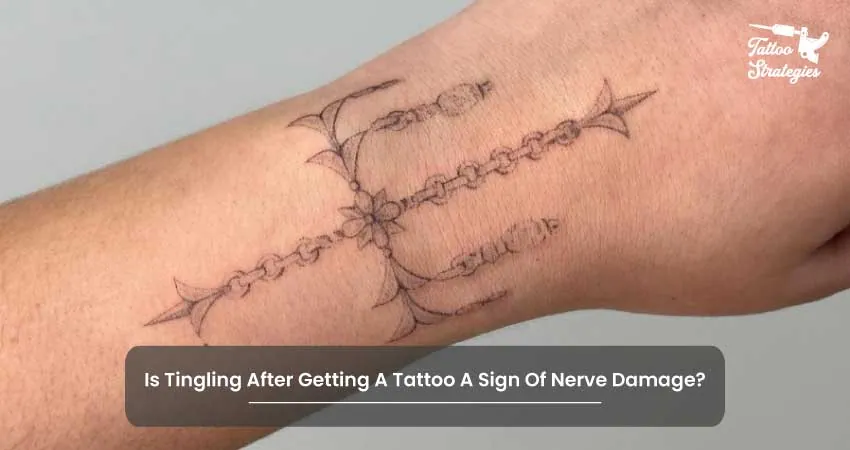
We all know fresh ink hurts for a few days but is tingling typical? Yes and no; that’s the answer.
“Pins and needles” are a common reaction to a freshly inked tattoo. Some individuals do feel tingling since their skin has recently gone through a lot of stress.
Your tattoo should have faded, and the skin around it should no longer feel tingling if it has healed. If that’s the case, you could have suffered nerve damage.
If this sounds like you, it may be time to schedule an appointment with your primary care doctor. The diagnosis should be solidified, and further instructions given by him.
Can I Get A Tattoo Even Though I Have Fibromyalgia?
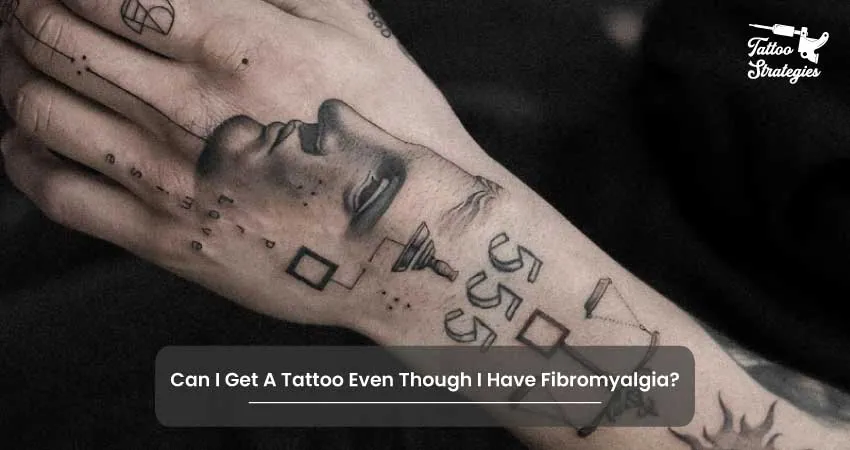
You can. But getting a tattoo while suffering from fibromyalgia will be very painful.
Because your brains and our nerves overreact and magnify pain signals, we experience more discomfort than is warranted. One of the hallmarks of this condition is heightened pain sensitivity, medically known as hyperalgesia.
Yet, there is still the issue of aggravation to consider beyond the pain. There are many who claim that the pain, along with the tattoo machine’s vibrations and loudness, is enough to send them into a state of anxiety.
If fibromyalgia causes you to have panic episodes and issues with sensory overload. Be warned that tattooing might have similar effects.
Nevertheless, there are many persons with fibromyalgia who choose to decorate their bodies with tattoos. Some people even claim that it helps them relax and forget about their regular aches and pains.
What Should You Be Worried About Before Getting Tattoed?
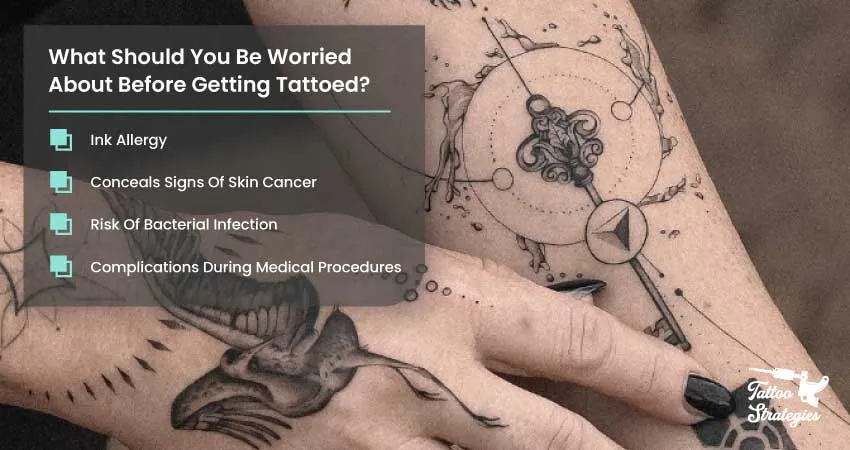
Although nerve damage is uncommon, there are additional hazards to think about before getting a tattoo:
Ink Allergy
Although ink allergies are not very common, people with sensitive skin face this issue. There is ink with harmful chemicals on the market that might lead you to have ink allergy. For this, you run the risk of developing allergies, either right away or over time. Try to ensure the ingredients in ink cause the least harm to your body.
Conceals Signs Of Skin Cancer
Choose a spot on your skin with no moles or birthmarks to stop this from happening. You could also talk to your doctor first before getting a tattoo.
Risk Of Bacterial Infection
A tattoo that has just been applied is like a raw spot on the skin. Therefore, it makes your body vulnerable to many bacterial illnesses. Septicemia, impetigo, erysipelas, and even toxic shock syndrome may all be brought on by bacteria like Streptococcus Pyogenes and Staphylococcus Aureus.
Complications During Medical Procedures
No one thinks about getting an MRI when getting a tattoo. But tattoos with metal-based ink may cause adverse reactions when exposed to MRI scanners. While allergic reactions to tattoo ink are very uncommon, you may want to request that your artist use inks that do not include metal.
Conclusion
So, by now, you should have your answer to the question, ‘Can you get nerve damage from tattoos?’
The answer is ‘highly unlikely.’ Use only the finest tattoo artists in your region to reduce the risk of nerve damage and other adverse tattoo outcomes (such as infection, ink allergy, tattoo blowout, etc.).
